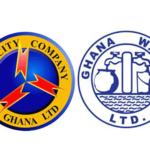
The destructive impact of illegal mining, known locally as galamsey, is now weighing heavily on Ghanaian consumers as the Ghana Water Company is demanding a steep tariff increase to be able to treat water for consumers.
The Ghana Water Company (GWC) has stated that the rising cost of treating polluted water has eroded its revenues, making tariff hikes unavoidable. The Ghana Grid Company (GRIDCo), which is requesting a 130% transmission tariff hike to sustain operations, argued that the existing tariff is inadequate and stressed the need for a cost-reflective rate to support its operations.
For the 2026–2030 review period, the GRIDCo is projecting tariffs to range between 13.04 pesewas and 13.44 pesewas per kilowatt-hour, excluding statutory levies.
In all, eight state utilities, including the Electricity Company of Ghana (ECG) and the Volta River Authority (VRA), have submitted proposals to the Public Utilities Regulatory Commission (PURC) for the 2025–2029 tariff period.
At a stakeholder forum on Tuesday, September 9, PURC committee chair Nana Yaa Jantuah said GWC’s request stands out as the highest among all utilities, largely due to the impact of galamsey on water treatment.
“Because of galamsey, the Ghana Water Company has a lot of issues with the water that they have to process for us to use,” she said.
“In no time, Ghana will be water poor. We may have to import water, and in that state, we will create vulnerabilities for the vulnerable because the poor cannot buy water from abroad.”
JoyNews‘ data analyst Isaac Kofi Agyei said that out of the eight utilities expected to present proposals, only VRA and GRIDCo have so far submitted their cases. He confirmed that GWC is seeking the highest increase, driven by soaring chemical costs.
“We have been checking the numbers, and in terms of how much the Ghana Water Company needs to buy chemicals this year, we are looking at around 336 million Ghana Cedis.
“If you compare how much they used to spend in 2022, we’ve seen a more than 200% increment in the budget for the purchase of chemicals,” he said.
He also noted that ECG is requesting a 224.6 per cent increase in its distribution charge, arguing that its cost-recovery level is far below regional benchmarks. Currently, ECG’s distribution cost accounts for about 11 per cent of tariffs, compared to an average of 30 per cent across the sub-region.
“So the main focus here is the GWC, which, according to the committee, has the highest tariff as a result of illegal mining, which is forcing them to budget close to about 334 million Ghana Cedis for chemicals this year,” he added.
Read Also: Ghanaians to pay more as ECG proposes 225% increase in Distribution Service Charge